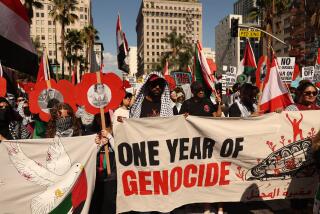L.A. Muslims Urge Safety for Pilgrims
Two days after a fire killed hundreds of Muslims on an annual holy pilgrimage to Mecca, Los Angeles-area Islamic leaders told followers that it is their duty to demand better safeguards from the Saudi Arabian government.
Speaking on Thursday before about 1,500 worshipers gathered at the Los Angeles Convention Center to celebrate Eid al-Adha--the commemoration of Abraham’s willingness to sacrifice his son to God--one Islamic official said the latest tragedy is only the most recent in a string of disasters near the holy city of Mecca that beg for an explanation.
“No more will we accept the saying that it is the will of God,” said Maher Hathout of the Islamic Center of Southern California. “The will of God for that place is peace, the will of God for that place is safety, the will of God for that place is security.”
Even as the pilgrims were returning Thursday to the plains around Mecca where at least 343 people died in the fire, a new blaze broke out, Saudi authorities said. The latest fire caused no injuries, however.
On Tuesday, more than a thousand people were injured in the tent city fire, which was believed to be the result of exploding canisters of cooking gas. Some of the victims were trampled to death as the crowds fled the flames that destroyed about 70,000 tents.
All followers of Islam whose health and finances allow it are obligated to make the holy pilgrimage to Mecca--called a hajj--at least once. The journey, made by as many as 2.5 million pilgrims each year, is one of the largest gatherings of people in the world.
Wasty Shindy, a civil servant in Los Angeles, sympathized with those who were still awaiting word of their loved ones. It took hours before he was able to reach his wife, who insisted on making the hajj this year with friends because she discovered she has cancer.
“Every year something happens,” Shindy moaned. “[The Saudis] have to be more careful with the people who go over there.”
In recent years, there have been several devastating incidents. In 1994, 270 pilgrims were crushed by other worshipers in a cavern; 1,426 people died in a human stampede in 1990; three years earlier, 402 people were killed when Saudi forces fought with Iranians during anti-U.S. demonstrations.
Hathout, while stressing the holiday’s theme of sacrifice at a time when people believe “greed is good,” also urged those gathered to mark the end of this year’s hajj by holding the Saudis accountable for pilgrims’ safety.
“Those who announce themselves as the guardians of these shrines should live up to the responsibility or give up the responsibility to another organization of Muslims,” Hathout said. “As much as I hate to say it, it is sloppiness and lack of awareness of safety measures that should be taken by the authorities and by the people themselves.”
Some American Muslims say they are inclined to be understanding of the Saudis’ difficulties in light of the numbers of faithful who descend on the country. “Statistically, people are more likely to die over here from a car accident,” said La Crescenta resident Kamal Hamdam, 33, holding his 3-year-old son Rami.
But others ask why the regime, known for its strict order and adherence to Muslim law, cannot also clamp down on unsafe practices.
Three years ago, Kareem Abdelhadi, 21, of Bell Gardens was eating dessert with his family on the evening of the Eid when his brother, then 16, received a devastating call.
Their father had just finished the final part of his hajj, the trip down Mt. Arafat, when he collapsed and died, presumably of heat exhaustion.
“Someone needs to take better care of them over there,” Abdelhadi said, adding that his only comfort is knowing that his father is in heaven.
In recent years, Saudi Arabia has spent $18.6 million to expand its holy sites and put cameras on roads, bridges and tunnels to monitor traffic. Hathout and others recommend that Saudis ban cooking, thereby removing the danger of open flames amid large crowds and high winds. They also want the Saudis to ensure easier movement in and out of the shrines and to teach better safety and hygiene.
“We have to do our part together to make it peaceful and safe--the government and us,” said Ihab Ghanem, an Egyptian visiting his wife’s family in West Los Angeles for the holiday. “Then, if something goes wrong it is the will of God.”
Associated Press contributed to this story.
More to Read
Sign up for Essential California
The most important California stories and recommendations in your inbox every morning.
You may occasionally receive promotional content from the Los Angeles Times.










